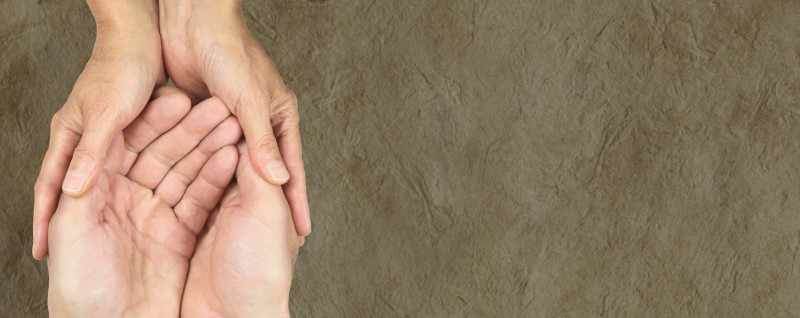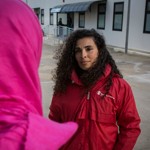
My last sort-of-goal for this year, and perhaps most important – is to do a little more for others, in whatever small way I can. So, this weekend just gone, I travelled to Calais. To the Jungle. The refugee camp. Although it’s not a camp. It’s almost a slum. That’s really trying to be a camp. It’s a slum, not because of the people living in it – they are doing their best to survive in tents and caravans and wooden huts. And it’s got nothing to do with the angel-like volunteers who are there unpaid working many hours and taking on roles that volunteers at Glastonbury festival would turn their noses up at. It’s a slum because, no one has offered or taken charge of this humanitarian crisis at ground-zero level. It’s a slum because it’s on waste land that was a dump. It’s a slum because there’s no real infrastructure or public health protection and it’s chaos.
Bear showed us around the camp. Bear is a super human (along with all the others)! He’s an assistant coordinator at the warehouse and the camp. The warehouse is where the coordination happens. Where the goods like food and blankets and clothes come in and get distributed out.
We needed a pass to enter the jungle, which was checked 3 times at 3 check points going into the camp by very unfriendly police.
Walking through that camp was one of the strangest experiences I’ve ever had. You’ll walk past groups of youths who look like they’re at holiday camp, playing badminton, football and scaling make-shift buildings. Then you’ll ask a guy if he’s OK and he gives you the hundred mile stare and says ‘No- I’m not OK- would you be?’ We all agreed with him. And tried to understand his point. But we couldn’t really understand. As we all have beds to go to, warm running water, heating, comfort and money flowing in and out of our bank accounts. Even if it’s only a little money.
Make no mistake – this is no holiday camp. These youths are finding ways to keep warm, numb the pain, boredom and escape the living reality of existing in the next town to Hell.
Why did I go? For two reasons. firstly to track down Phoebe Hope – the caravan my family donated to the Camp. It is named after my cousin Oliver and his lovely wife Fiona’s little girl who passed away as a young baby last year. And to see if I could talk to the family who live in her now. I was told I may not find her. As there are no allocated plots (this isn’t a caravan park either). There are thousands living there now in caravans, tents and makeshift huts.
There aren’t many words that I can use to explain what I saw that day and I’m still trying to process it now. But what I can say that in the despair, there are glimmers of hope. In the sadness there is strong faith. In the dismay there is still laughter and in the humiliation there is still pride.
I found my own emotions swung between intrigue, despair and inertia. One minute I was enjoying a light joke with a native camp dweller, who asked me to take photos of him posing and the next I was looking at a baby peering out of the back of a caravan.. The baby wanted to go outside but I realised that a baby would not even be able to walk on this ground, littered with all sorts of everything and muddy puddles the size of small streams. The babies are like little prisoners, or like baby chicks caged-in unable to feel or experience much freedom. And no matter what you read in the press – about it being all men, trying to sneak into the UK, there are many families here, with small children. This is one of the saddest parts of camp life.
This level of poverty I have witnessed before. My daughter’s papa is from the poorest country in South America, Bolivia. Many people live like this there. I spent a few months in Bolivia and many people in extreme poverty are happy (they smile and laugh a lot) and not starving (they have access to 2 meals a day). I’m not romanticising poverty. Poverty is shit. Poverty deprives you and steals your time and energy. Poverty can strip you of your self worth and pride. I could tell when I walked past the group of grown men washing at the make-shift wash area (taps on wooden boards) that they felt humiliated as I looked at them, so I looked away quickly and swallowed the lump in my throat.
We know many people all over the world live like this. In many countries, from Brazil to the Philippines. But there’s something very wrong about this here. The real asylum seekers will have arrived after travelling for weeks, months even. Broken and exhausted, weak, humiliated, tortured and traumatised. The last thing they need to hear is ‘Why are you here? Why didn’t you go there? Why aren’t you doing things properly? Why aren’t you being a sensible, well-organised asylum seeker and going down the ‘proper route’? Why didn’t you google your nearest refugee centre (over in Turkey or elsewhere) and travel there instead?’ Why, why, why?
I was listening to Greg James from BBC Radio One talking today on the morning show – he travelled to Jordan to speak with the refugees there. And I couldn’t agree more than with this point about them not wanting to be in this situation. These people fled their lovely homes, studies and good jobs, usually with nothing or very little. They ran and sailed and begged. They were terrified and hungry. Many don’t want our precious benefits (and I know they are precious, to us and everyone in the UK) – they want help. And after they have had some help, they want to return to their beloved countries. To help re-build them and create lovely homes and lives once more.
Bear took us to Afghan Square, where the enterprising folk have set up small shops and restaurants. Unfortunately, we didn’t have time to sample the goods this time, but I intend to eat there next time and support them in supporting themselves.
Many charities (from Britain and France) are doing amazing work there every day. There’s a church – a tranquil haven in amidst all the madness. There’s a theatre dome – for creative endeavours, a small school, a women and children’s centre, a health centre, a youth centre and a legal centre. All set up in old donated shabby tents or shanty huts – this is human civilisation springing up and rising in the face of the lowest adversity.
So, we were walking through a group of shabby caravans and Rebecca from Caravans for Calais turned to me and said ‘There’s Phoebe Hope’ and pointed to a green, weathered looking van. We knocked on the window and it was opened by a lady and her teenage son. Bear explained who I was and I promptly showed her a photo of my daughter standing at the door of Phoebe Hope. I can’t explain what happened but it was one of the most moving experiences of my life. She ran out and held me and thanked me over and over. She couldn’t speak English but her son Sajjad could speak a little. Fatima offered me food and tea in her little van. Her son repeated ‘This is your van’. I said ‘No, it’s yours’. I went and sat with her briefly and she showed me a hand drawn picture of her 7 year old son Mohamat. (Her other family members were at the little children’s school). Our tears dropped as we hugged and I promised to visit again. I only got a few minutes with Fatima, but I felt deeply connected.
Living in the town next to hell is not a choice anyone in their right mind would make. It is the ground-zero of choices. Whether you’re an economic migrant or a war refugee. It’s awful.
The next time I make the trip, it will be to spend the full day with Fatima and her family and to hear their stories. I also hope to start setting up a creative project for the women and children’s centre too.
Something that will stay with me is the spirit and generosity of all the people there. I smiled at a man sitting outside his wooden coffin-like hut (about 6 ft tall by 3 ft wide). There were 3 beds built like bunks inside. He had a bunch of bananas and insisted on giving me one. I wanted to refuse but I thought – humans need to share. It’s in the fibre of our being. So, I stood and ate a banana with him. Looking out into the jungle chaos in silence. I bowed and said thank you and walked away, then I got into the comfy car, ready to sail back to my warm, comfy life.
Each night since I’ve returned, after tucking my little one in to bed and kissing her all over her sweet face, and I sink into my own warm, soft bed- I think about Fatima. Crammed into our little old caravan with 5 of her family. I think about her dreams for her three children, her life before the war, about what she’s doing to stay sane and survive. And she’s one of the lucky ones.
 Kerrie is a success mentor for heart-centred creatives. Shortlisted in the UK last year for the ‘Woman to Watch Award’ at the National Women Inspiring Women Awards, Kerrie works with all aspired, loved-up folk to help them start their fire in work, passion and purpose.
Kerrie is a success mentor for heart-centred creatives. Shortlisted in the UK last year for the ‘Woman to Watch Award’ at the National Women Inspiring Women Awards, Kerrie works with all aspired, loved-up folk to help them start their fire in work, passion and purpose.



Thanks, Kerrie, for this moving account.
We forget sometimes about these dear ones who struggle so hard each day just trying to survive. When it leaves the headlines, it sometimes leaves our awareness. Thank you for providing information on how to help.
Sending blessings! Malissa